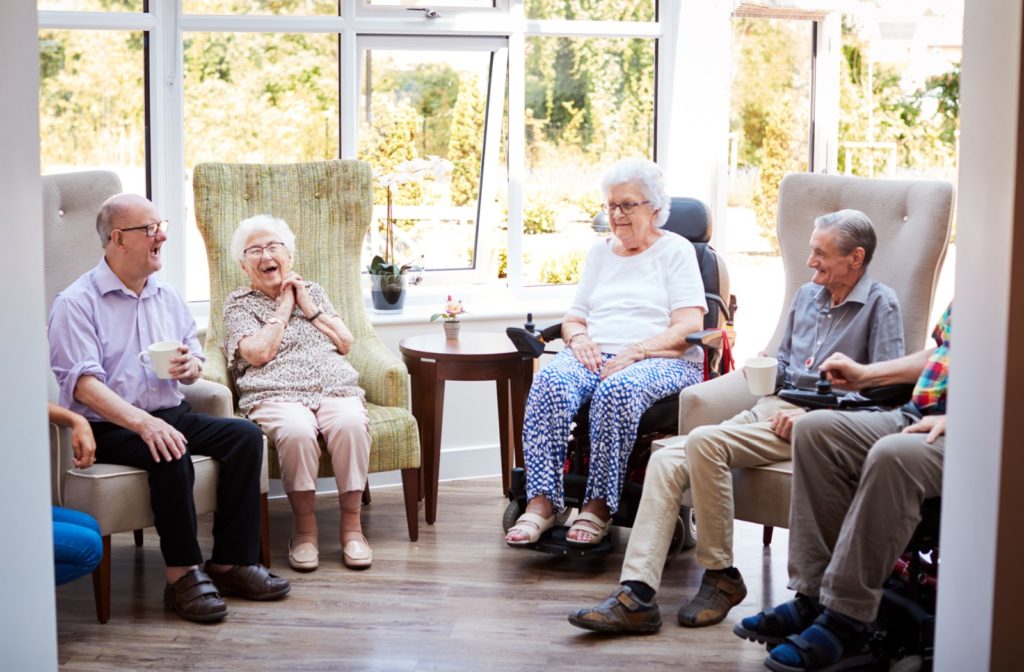Caring for someone with dementia can be challenging at times. Apart from managing their daily needs, communication with your loved one can become difficult as their condition progresses.
It’s important to remember that individuals with dementia may struggle with language, social cues, and other forms of communication, which can lead to frustration on both ends.
However, they are still the people you love and they still deserve your respect, attention, and care. Keeping them engaged with visits and conversation is one of the most important things you can do for them.
If you’re a caregiver for someone with dementia, here are some communication tips to keep in mind:
- Speak clearly & concisely
- Use nonverbal communication
- Practice active listening
- Avoid overstimulation and distractions
- Be patient and kind
- Avoid arguing
- Use memory aids
- Seek support
It may also help to get assistance from trained professionals, too. Memory care services can provide a compassionate environment in a community of people who understand and can relate to your loved one’s experiences.
Speak Clearly & Concisely
It’s essential to speak in a clear and concise manner when communicating with someone with dementia. Use short and straightforward sentences, and try to avoid using complex terms or phrases.
Speak slowly and use a gentle tone, as this can help the person better comprehend your message, and respond accurately. Use positive affirmations that reassure and comfort your loved one, and keep your tone positive, encouraging, and supportive.
Nonverbal Communication
Since people with dementia may have difficulty processing verbal communication, nonverbal communication can be beneficial. You can use physical touch, facial expressions, and other means of nonverbal communication to help convey your message.
For example, hugging or holding hands may help your loved one feel connected to you, even if they aren’t able to understand your words.
Active Listening
Active listening is a crucial communication skill for caregivers. Give your loved one ample time to express themselves, and try to understand their perspective.
Once they have finished speaking, you can repeat what they have said back to them and ask if you understand correctly. This shows them that you’re actively listening to them, which can help minimize misunderstandings.
Avoid interrupting or finishing their sentences, as this can be disorienting, and allow them to express themselves fully. You can also ask open-ended questions to encourage conversation.
Avoid Overstimulation & Distractions
People with dementia can struggle to focus on one thing for long periods of time. Avoid overstimulating environments and distractions that can lead to confusion or frustration.
Keep the environment calm, quiet, and free from stimulating noises and objects. Minimize background noise when you try to communicate with them and choose a room that is familiar and comfortable for both of you.
Be Patient & Kind
Trying to communicate with a loved one who has dementia can be frustrating at times, but it’s important to remain calm and patient. Try not to get frustrated or angry, even if your loved one is repeating themselves or struggling to communicate. Remember that they are doing their best, and your patience and kindness can make a difference.
Avoid Arguing
It’s common for individuals with dementia to repeat themselves, make false accusations, or become confused. Instead of engaging in an argument, try redirecting their attention by changing the subject or introducing a calming activity. It is important to accept their behavior if it isn’t harmful to themselves or to anyone else, and to work with it.
Memory Aids
Some caregivers can find it helpful to use memory aids to help remind their loved ones of important information or time-sensitive tasks. This could include notes, clocks, calendars, photographs, or videos.
Seek Support
Caring for someone with dementia can be emotionally challenging. Seek support from friends, family, support groups, or a memory care community.
Share your experiences, and learn from others who have faced similar communication challenges. Taking care of your emotional well-being is crucial for providing the best possible care.

Strategies for Effective Communication
As a dementia caregiver, effective communication is essential for providing care and support for your loved one. Remember to speak clearly and concisely, use nonverbal communication, actively listen, practice patience, use memory aids when applicable, and avoid arguing.
By incorporating these tips into your communication style, you can improve the quality of life for both you and your loved one. And remember, you can always seek support from family, friends, and the trained professionals at The Legacy of Delano Senior Living. Book a tour today to see how we can help you and your loved one.



